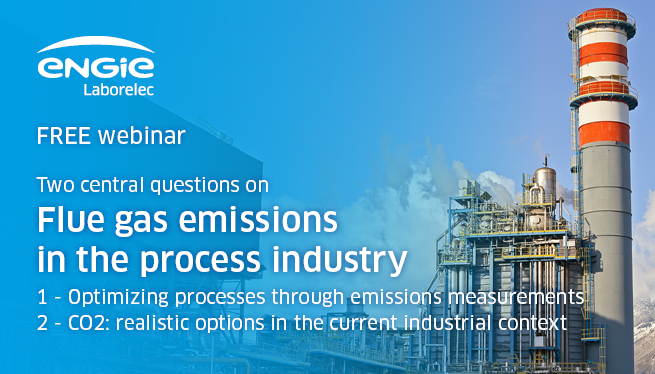Webinar | Flue gas emissions in the process industry
In this one-hour webinar we explore two issues of central concern in the present-day industrial context.
1 - How can emissions measurements help optimize your flue gas treatment process?
In the first part of the webinar, we demonstrate how emission monitoring must not just be seen as a legal obligation, it can also lead to improved flue gas treatment process performance. We illustrate this with examples from the field showing how monitoring plays a crucial role in assessing and improving performance in denitrification by selective catalytic reduction (SCR deNOx) and dedusting using electrostatic precipitators (ESP) processes.
2 - Capturing and valorizing CO2: what are the realistic options in the current industrial context?
To meet the EU’s commitment to reduce greenhouse gas emissions by at least 40% by 2030 and by 80-95% by 2050, every industrial sector will have to contribute. But it can be a complex task for industrial corporations to find their way through the technologies that make CCU possible. Some of these technologies are immature, but recent technological breakthroughs open up real prospects for CO2 valorization on an industrial scale. So, what is realistic and what is not?
Meet the experts
An engineer with a Master’s in Environmental Engineering, Nathalie Faniel specializes in flue gas treatment, focusing on equipment design, plant start-up and operation, and selective catalytic NOx reduction. She also specializes in the control and monitoring of atmospheric emissions, including compliance issues and process measurement.
Nathalie began her career at an engineering company where she designed and was responsible for flue gas treatment system start-up in waste incinerator plants. She then moved on to take charge of environmental aspects of the Brussels waste incineration plant, before joining ENGIE Laborelec in 2005.
Hélène Lepaumier is a specialist in flue gas emissions and CO2 capture and use (CCU). At ENGIE Laborelec, she manages technical projects related to CO2, including feasibility studies in a diverse range of industrial sectors. Hélène has also been involved in a number of European CCU projects. Her principal areas of expertise include solvent degradation, emission monitoring, CO2 quality and environmental impact.
With a Master’s in Organic Chemistry, Hélène went on to obtain a PhD in the field of post-combustion CO2 capture from the University of Savoie in collaboration with IFP Energies Nouvelles. After taking up a research position at NTNU in Norway, she joined ENGIE Laborelec in 2010.

What happens to my personal data?
This form collects a small quantity of personal information to help ENGIE Laborelec better understand the needs and areas of interest of its audience, and adapt the company’s offer of webinars, training courses and technical services. In some very limited circumstances, we may use it to contact you with carefully selected content which we think may be helpful for your business or activities. Personal data will be treated according to the ENGIE privacy statement and will be deleted after 12 months.


